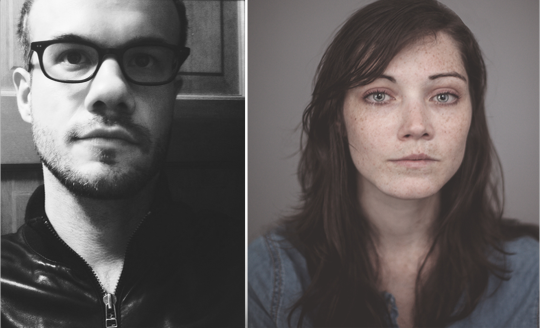
Sarah Gerard and Danniel Schoonebeek in Conversation
Danniel Schoonebeek and Sarah Gerard sat down at Momo Sushi Shack on a Friday night before a poetry reading. Danniel’s first book of poems, American Barricade, was published in the winter of 2014. Sarah’s first novel, Binary Star, just came out from Two Dollar Radio. They asked each other questions about what the other does. Writing novels seems unfathomable to Danniel, and writing poems seems unfathomable to Sarah. They wanted to get to the bottom of it.
I. SEASONING THE SKILLET FOR TRAGEDY
DANNIEL SCHOONEBEEK: The first thing I want to talk about is naming: names in general, how that happens for you when you start a story. Do you feel at all boxed in by names? Like Nora, like Sarah?
SARAH GERARD: I wrote a story recently and named acharacter Rosalie. I liked the name a lot and I wanted to use the diminutive,which is Rosie. At certain points in the story, there are two characters whodon’t realize they’re talking about the same person. One person is saying
Rosalie, one person is saying Rosie.
I showed it to my husband, David, who’s my
first reader, and he said, “That’s a Latin name.” And I said no. He
insisted, and I kept saying no, it’s not.
The story is about the circumstances
surrounding this character’s abortion and I knew that it could be problematic
if I, as a white writer, were to include a person of color inadvertently in
this controversial situation, because I’m not qualified to inhabit her
experience. I didn’t want to pretend to know what that situation could be like
for a person of color—certainly it is very different for a white woman than for
a Latina woman. So, finally, I changed her named to Danielle, which then became
Dani.
DS: I always wonder if it’s frustrating for
fiction writers to just name a character John.
SG: In Binary
Star, the narrator’s boyfriend is named John. It’s universal; it can be
anybody. I prefer for my writing to remain ambiguous at times. I haven’t yet
needed in my work to appeal to character archetypes.
I wanted to talk about John Steinbeck
with you because you write very narratively. You have characters in your poems who appeal to an Americana that reminds me a lot of Steinbeck. It seems
like you’re almost trying to write stories. You’re keeping a safe distance. One
foot in poetry, one foot in fiction.
DS: People don’t want anything to do with
narrative, which I think is weird. That revulsion isn’t the reading tradition I
come from, even if it’s the writing tradition I come from. It’s hard...
You have reached your article limit
Sign up for a digital subscription and continue reading all new issues, plus our entire archives, for just $1.50/month.
Already a subscriber? Sign in




